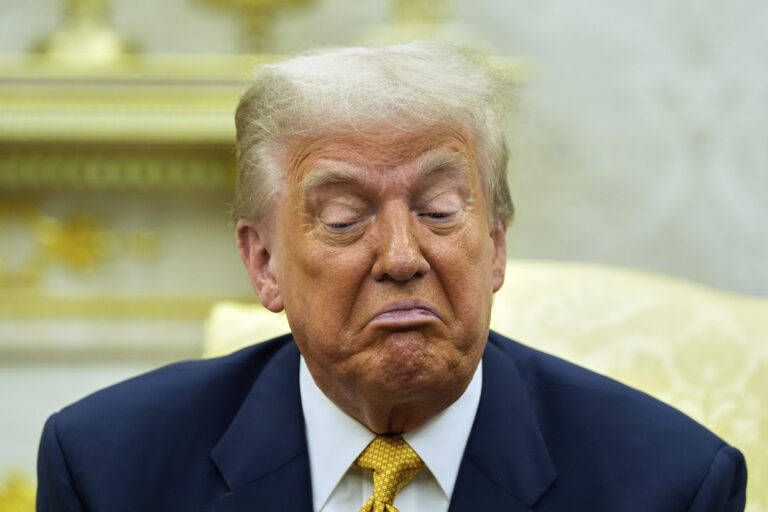The FBI redacted Donald Trump’s name, along with the names of other prominent public figures, from references in the Jeffrey Epstein files, three people familiar with the matter told Bloomberg’s Jason Leopold.
Internal directives instructed about 1,000 FBI agents to flag any mention of Trump during a March review of roughly 100,000 pages of records, people familiar with the process told Bloomberg.
The Justice Department said the review turned up no “client list” or evidence linking Trump to criminal activity, despite his name appearing in Epstein’s contact book and flight logs.
Newsweek has reached out to the FBI via email on Friday morning for comment.
Why It Matters
The president and senior White House officials have repeatedly said in recent weeks that there was no reason to release the remaining Epstein files, and they have sought to move on from the saga despite calls from Trump’s base to release all documents as promised.

Associated Press
What To Know
The Bloomberg report said that earlier this year, FBI agents were directed to search for all documents associated with the Epstein case and determine which could be released, totaling tens of thousands of pages, following Attorney General Pam Bondi’s request for them.
During the review, in March, FBI personnel were said to have identified numerous references to Trump and other high-profile people, with the names then redacted by FOIA officers because they were private citizens at the time—a common practice under FOIA case law.
After the redactions, the files were sent to Bondi, who then reportedly told Trump in May that his name was in the files.
Then, in early July, the Justice Department and FBI released a joint statement, saying they had concluded that no further documents needed to be disclosed.
“While we have labored to provide the public with maximum information regarding Epstein,” the statement read, “it is the determination of the Department of Justice and the Federal Bureau of Investigation that no further disclosure would be appropriate or warranted.”
Privacy concerns and protections for victims have been cited as reasons for withholding additional material, a decision that has drawn bipartisan criticism and renewed scrutiny of the files’ handling.
Trump has said he believes his name was added to the files by former President Barack Obama and others within his administration.
Trump And Epstein’s Relationship Explained
Trump and Epstein, both New Yorkers, first knew each other in the late 1980s. There were several documented instances of the pair socializing and partying in the years that followed, including at Mar-a-Lago and in New York City.
They spent about 15 years as friends, per Trump’s own recounting. He told New York magazine in 2002 that Epstein was a “terrific guy.”
The president has said that he then fell out with Epstein and had not talked to him in more than a decade before the financier’s arrest in 2019. Epstein, a convicted sex offender, died by suicide behind bars that year while awaiting trial on sex trafficking charges.
What Happened On Epstein’s Island?
Epstein owned a private island in the U.S. Virgin Islands, where he held lavish parties but also allegedly carried out the sexual abuse of young girls.
In 2020, prosecutors alleged a criminal enterprise took place on the island, with Epstein transporting underage girls and young women to the island to be used for sex by those in his inner circle. Some victims were as young as 11 years old.
Epstein’s estate settled a $105 million lawsuit in 2022 with the U.S. Virgin Islands.
Did Trump Visit Epstein’s Island?
Records have shown that Trump took at least eight flights on Epstein’s private jet between 1993 and 1997, but they were between New York and Florida.
The saga over the files related to Epstein’s case renewed questions over whether Trump had ever gone further and visited the island Epstein owned.
On Monday, Trump told reporters he had “never had the privilege” of visiting and that he had turned down an invitation from Epstein to go.
What People Are Saying
President Donald Trump told reporters earlier this week: “The whole thing is a hoax. They ran the files. I was running against somebody that ran the files. If they had something they would have released.”
Representative Robert Garcia, a California Democratic, on MSNBC on Friday: “Donald Trump, after spending years campaigning, promising to release the files, making it central to his whole message when running for the presidency, has now done a complete flip. He is obviously hiding something.”
What Happens Next
While Trump seeks to distance himself from the case, questions continue to come from all sides of the political spectrum over the unreleased files.
Update 8/1/25, 11:45 a.m. ET: This article was updated with new information and remarks.


